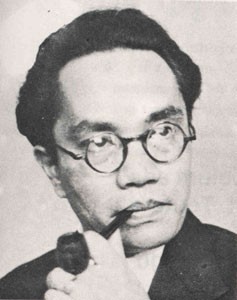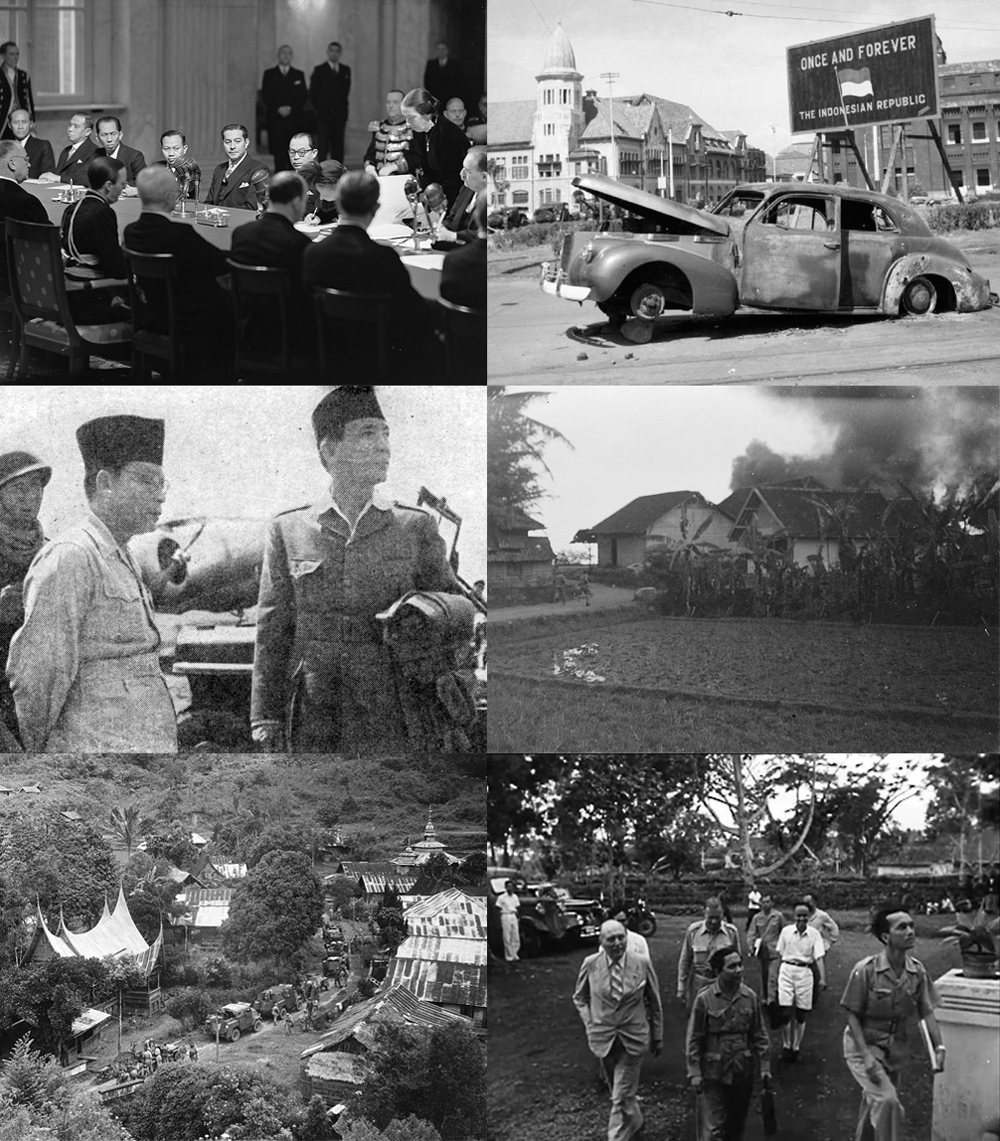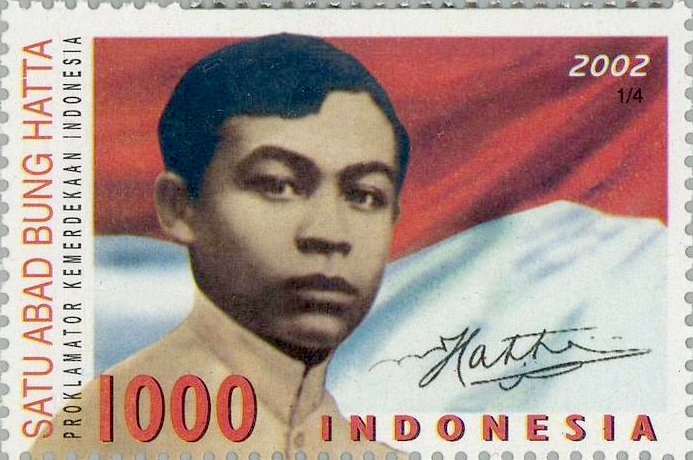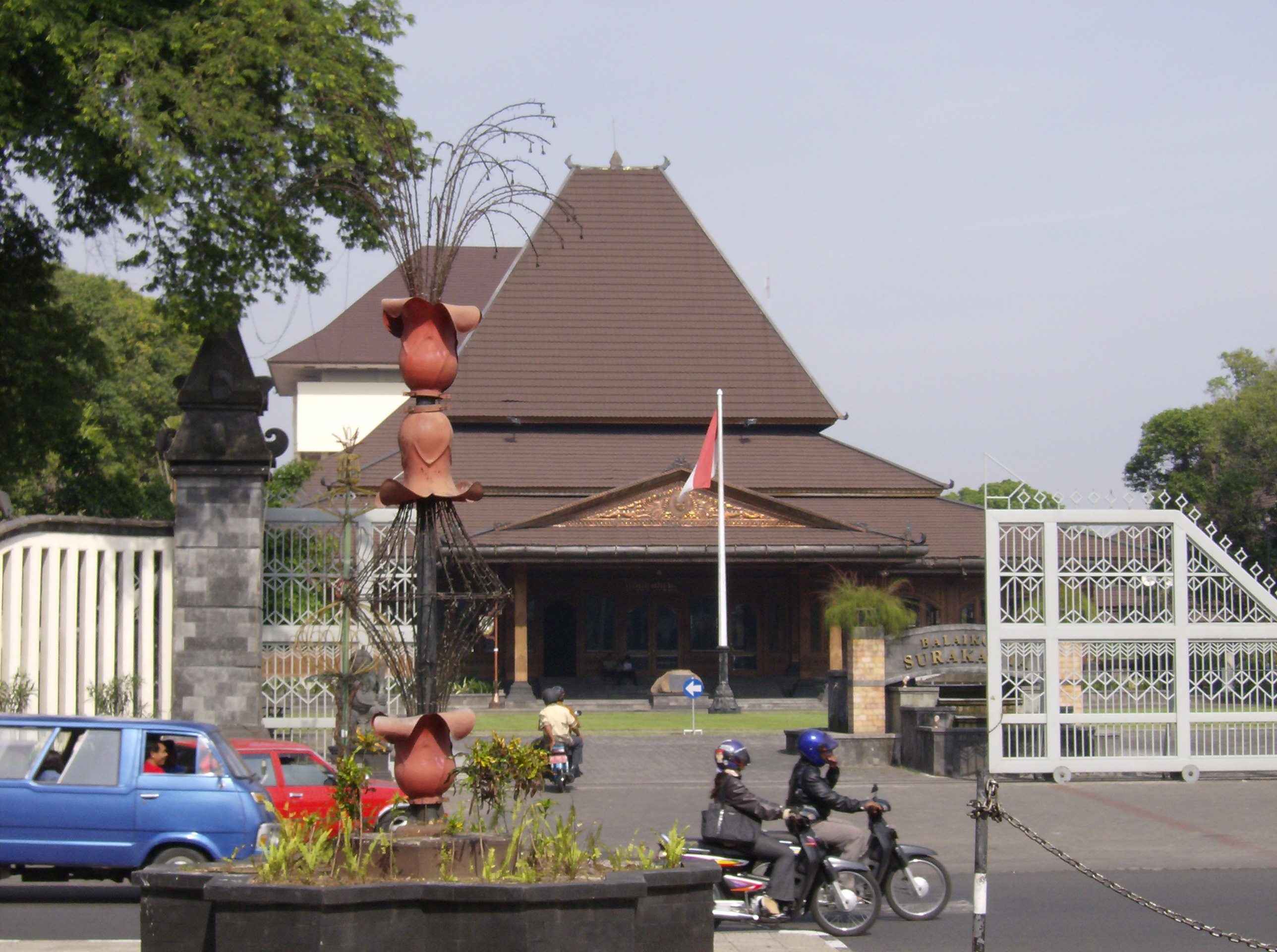|
Sjarifuddin
Amir Sjarifuddin Harahap (Van Ophuijsen Spelling System, EVO: Amir Sjarifoeddin Harahap; 27 April 1907 – 19 December 1948) was an Indonesian politician and journalist who served as the second prime minister of Indonesia from 1947 until 1948. A major leader of the Left-wing politics, left-wing during the Indonesian National Revolution, he previously served as Ministry of Communication and Information Technology (Indonesia), Minister of Information from 1945 until 1946 and Ministry of Defense (Indonesia)#List of ministers, Minister of Defense from 1945 until 1948. Amir was born into the Sumatran aristocracy, and was educated at Leiden University. At Leiden, he became a member of the board of the Gymnasium (school), Gymnasium student association in Haarlem, and was involved in the Batak student organization ''Jong Batak Bond, Jong Batak''. He returned to Indonesia due to family troubles, but continued his education at the ''University of Indonesia, Rechts Hogeschool'' in Batav ... [...More Info...] [...Related Items...] OR: [Wikipedia] [Google] [Baidu] |
Socialist Party (Indonesia)
The Socialist Party ( id, Partai Sosialis) was a political party in Indonesia. It was founded in December 1945 at a meeting in Cheribon, as the Socialist People's Party (Paras) of Prime Minister Sutan Sjahrir and the Socialist Party of Indonesia (Parsi) of Defence Minister Sjarifuddin merged. Sjahrir became chairman of the unified party, whilst Sjarifuddin became vice-chairman.Rose, Saul. ''Socialism in Southern Asia''. London: Oxford University Press, 1959. p. 147 In January 1946, the party and its youth wing Pesindo, joined (along with all other major political forces at the time) the Tan Malaka-led national front Persatuan Perdjuangan. By February the same year, the Socialist Party had come to view the Persatuan Perdjuangan as an attempt to replace the existing government, and the party and Pesindo withdrew. Following their withdrawal, the Persatuan Perdjuangan was able to pressure Sjahrir to resign from his position as Prime Minister. Sukarno offered the Persatuan Perdjuangan ... [...More Info...] [...Related Items...] OR: [Wikipedia] [Google] [Baidu] |
Jong Batak Bond
Jong Batak Bond (Dutch language, Dutch for "young Batak association"), sometimes simply called Jong Batak, was a short-lived but influential Batak intellectual organization founded in Batavia, Dutch East Indies, Batavia, Dutch East Indies (today Jakarta) in December 1925. Like Budi Utomo, and other such organizations, its members consisted of native Indonesians, Indonesian students in Dutch-language schools interested in advancing their ethnic group and Indonesian nationalism at the same time. Notable members of the group include Amir Sjarifuddin Harahap, Todung Sutan Gunung Mulia Harahap, Sanusi Pane, Saleh Said Harahap and Arifin Harahap. Members of the organization represented by Sjarifuddin Harahap participated in the 1928 Youth Pledge which is considered to be one of the major events in the development of the Indonesian nationalist movement. By 1930 Jong Batak, and most of the other "ethnic" associations, had merged into the pan-Indonesian group founded by Sukarno, . History ... [...More Info...] [...Related Items...] OR: [Wikipedia] [Google] [Baidu] |
Gerindo
Gerindo (Indonesian People's Movement) ( id, Gerakan Rakyat Indonesia) was a pre-independence leftist nationalist political party in Indonesia. It adopted an anti-fascist stance, supporting the Dutch against the common threat from Empire of Japan, Imperial Japan, seeing this as a higher priority than immediate Indonesian independence. It subsequently joined with other nationalist parties to form the Indonesian Political Federation (GAPI). Background In 1931, Bonifacius Cornelis de Jonge became Governor-General of the Dutch East Indies and took a more hardline approach to Indonesian nationalist movements than his predecessor. As part of the clampdown, non-cooperative nationalist leader Sukarno was arrested in November 1934 followed by Mohammad Hatta, Hatta and Sutan Sjahrir, Sjahrir three months later. All were exiled, while Sukarno's Partindo, Indonesia party (Partindo) party, found itself leaderless. By 1935, as a result of legislation, detentions and police actions, the only non- ... [...More Info...] [...Related Items...] OR: [Wikipedia] [Google] [Baidu] |
Japanese Occupation Of The Dutch East Indies
The Empire of Japan occupied the Dutch East Indies (now Indonesia) during World War II from March 1942 until after the end of the war in September 1945. It was one of the most crucial and important periods in modern Indonesian history. In May 1940, Germany occupied the Netherlands, and martial law was declared in the Dutch East Indies. Following the failure of negotiations between the Dutch authorities and the Japanese, Japanese assets in the archipelago were frozen. The Dutch declared war on Japan following the 7 December 1941 Attack on Pearl Harbor. The Japanese invasion of the Dutch East Indies began on 10 January 1942, and the Imperial Japanese Army overran the entire colony in less than three months. The Dutch surrendered on 8 March. Initially, most Indonesians welcomed the Japanese as liberators from their Dutch colonial masters. The sentiment changed, however, as between 4 and 10 million Indonesians were recruited as forced labourers ('' romusha'') on economic deve ... [...More Info...] [...Related Items...] OR: [Wikipedia] [Google] [Baidu] |
Ministry Of Defense (Indonesia)
The Ministry of Defense ( abbreviated ''Kemhan'') of the Republic of Indonesia is a government ministry responsible for the defense affairs of Indonesia. The ministry was formerly known as the Department of Defense (Indonesian: ''Departemen Pertahanan Republik Indonesia'', abbreviated as ''Dephan'') until 2009 when the nomenclature changed based on Law Number 39 of 2008 dated 6 November 2008 concerning State Ministries, the name of the Department of Defense was changed to the Ministry of Defense of the Republic of Indonesia. The currently-appointed minister is Prabowo Subianto replacing Ryamizard Ryacudu on 23 October 2019. The Ministry of Defense are one of the three ministries (along with Ministry of Foreign Affairs and Ministry of Home Affairs) explicitly mentioned in the Constitution of Indonesia, which means the three ministries cannot be replaced or dissolved by the President. If both the President and Vice President of Indonesia were to die, resign, or are unable to pe ... [...More Info...] [...Related Items...] OR: [Wikipedia] [Google] [Baidu] |
Indonesian National Revolution
The Indonesian National Revolution, or the Indonesian War of Independence, was an armed conflict and diplomatic struggle between the Republic of Indonesia and the Dutch Empire and an internal social revolution during Aftermath of WWII, postwar and Dutch East Indies#World War II and independence, postcolonial Indonesia. It took place between Indonesian Declaration of Independence, Indonesia's declaration of independence in 1945 and the Netherlands' Dutch–Indonesian Round Table Conference, transfer of sovereignty over the Dutch East Indies to the Republic of the United States of Indonesia at the end of 1949. The four-year struggle involved sporadic but bloody armed conflict, internal Indonesian political and communal upheavals, and two major international diplomatic interventions. Dutch military forces (and, for a while, the forces of the World War II Allies, World War II allies) were able to control the major towns, cities and industrial assets in Republican heartlands on Ja ... [...More Info...] [...Related Items...] OR: [Wikipedia] [Google] [Baidu] |
Communist Party Of Indonesia
The Communist Party of Indonesia (Indonesian: ''Partai Komunis Indonesia'', PKI) was a communist party in Indonesia during the mid-20th century. It was the largest non-ruling communist party in the world before its violent disbandment in 1965. The party had two million members in the 1955 elections, with 16 percent of the national vote and almost 30 percent of the vote in East Java. During most of the period immediately following independence until the eradication of the PKI in 1965, it was a legal party operating openly in the country. History Forerunners The Indies Social Democratic Association (Dutch: ''Indische Sociaal-Democratische Vereeniging'', ISDV) was founded in 1914 by Dutch socialist Henk Sneevliet and another Indies socialist. The 85-member ISDV was a merger of the two Dutch socialist parties (the SDAP and the Socialist Party of the Netherlands), which would become the Communist Party of the Netherlands with Dutch East Indies leadership. The Dutch members of the ... [...More Info...] [...Related Items...] OR: [Wikipedia] [Google] [Baidu] |
Mohammad Hatta
Mohammad Hatta (; 12 August 1902 – 14 March 1980) was an Indonesian statesman and nationalist who served as the country's first vice president. Known as "The Proclamator", he and a number of Indonesians, including the first president of Indonesia, Soekarno, fought for the independence of Indonesia from the Dutch. Hatta was born in Fort de Kock, Dutch East Indies (now Bukittinggi, Indonesia). After his early education, he studied in Dutch schools in the Dutch East Indies and studied in the Netherlands from 1921 until 1932. Early life, family, and early education Early life and family Hatta was born in Fort De Kock (now known as Bukittinggi) on 12 August 1902 into a prominent and strongly Islamic family. His grandfather, Sheikh Abdurrahman, was a respected Naqshbandi-Khalidi murshid in Batuhampar, near Payakumbuh. His father, Haji Mohammad Djamil, died when he was eight months old and he was left with his six sisters and his mother. As in the matrilineal society of Minangka ... [...More Info...] [...Related Items...] OR: [Wikipedia] [Google] [Baidu] |
Sutan Sjahrir
Sutan Sjahrir (5 March 1909 – 9 April 1966) was an Indonesian politician, and revolutionary independence leader, who served as the first Prime Minister of Indonesia, from 1945 until 1947. Previously, he was a key Indonesian nationalist organizer in the 1930s and 1940s. Unlike some of his colleagues, he did not support the Japanese during the Japanese occupation and fought in the resistance against them. He was considered to be an idealist and an intellectual. Born to a Minangkabau family, he studied at the University of Amsterdam, and later became a law student at the Leiden University. He became involved in Socialist politics, and Indonesia's struggle for independence, becoming a close associate of the older independence activist Mohammad Hatta, who would later become the first Vice President of Indonesia. During the Japanese occupation of the Dutch East Indies, Sjahrir fought in the resistance. Towards independence on 17 August 1945, he was involved in the Rengasdengklok I ... [...More Info...] [...Related Items...] OR: [Wikipedia] [Google] [Baidu] |
Mohammad Natsir
Mohammad Natsir (17 July 19086 February 1993) was an Islamic scholar and politician. He was Indonesia's fifth List of Prime Ministers of Indonesia, prime minister. After moving to Bandung from his hometown Solok, West Sumatra for senior high school, Natsir studied Islamic doctrine extensively. His first articles were published in 1929, and during the 1930s he wrote for several Islamic-themed papers. He entered politics in the mid-1930s, rising through the ranks of Islamic parties. On 5 September 1950, he was chosen as prime minister, a term which he served until 26 April 1951. After his term as prime minister, he became increasingly vocal about Islam's role in Indonesia and was eventually arrested for doing so. Released in 1966 after the New Order (Indonesia), New Order government took power, Natsir continued to be critical of the government, eventually leading to him being banned from traveling. He died in his home in Jakarta, on 6 February 1993. Natsir wrote extensively on Isla ... [...More Info...] [...Related Items...] OR: [Wikipedia] [Google] [Baidu] |
Surakarta
Surakarta ( jv, ꦯꦸꦫꦏꦂꦠ), known colloquially as Solo ( jv, ꦱꦭ; ), is a city in Central Java, Indonesia. The 44 km2 (16.2 sq mi) city adjoins Karanganyar Regency and Boyolali Regency to the north, Karanganyar Regency and Sukoharjo Regency to the east and west, and Sukoharjo Regency to the south. On the eastern side of Solo lies Solo River (Bengawan Solo). Its built-up area, consisting of Surakarta City and 59 districts spread over seven regencies ("Greater Solo Area", formerly Special Region of Surakarta), was home to 3,649,254 inhabitants as of 2010 census, around half million of which reside in the city proper. Surakarta is the birthplace of the current President of Indonesia, Joko Widodo. He served as Mayor of Surakarta from 2005 to 2012. History Hominid habitation in the region of Surakarta is evidenced from roughly one million years ago, the age of the "Java Man" skeleton found 80 kilometers upstream. Another famous early hominid from this area is called ... [...More Info...] [...Related Items...] OR: [Wikipedia] [Google] [Baidu] |
Sumatra
Sumatra is one of the Sunda Islands of western Indonesia. It is the largest island that is fully within Indonesian territory, as well as the sixth-largest island in the world at 473,481 km2 (182,812 mi.2), not including adjacent islands such as the Simeulue, Nias, Mentawai, Enggano, Riau Islands, Bangka Belitung and Krakatoa archipelago. Sumatra is an elongated landmass spanning a diagonal northwest–southeast axis. The Indian Ocean borders the northwest, west, and southwest coasts of Sumatra, with the island chain of Simeulue, Nias, Mentawai, and Enggano off the western coast. In the northeast, the narrow Strait of Malacca separates the island from the Malay Peninsula, which is an extension of the Eurasian continent. In the southeast, the narrow Sunda Strait, containing the Krakatoa Archipelago, separates Sumatra from Java. The northern tip of Sumatra is near the Andaman Islands, while off the southeastern coast lie the islands of Bangka and Belitung, Karim ... [...More Info...] [...Related Items...] OR: [Wikipedia] [Google] [Baidu] |








